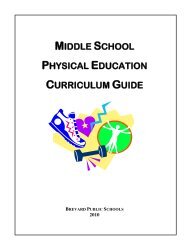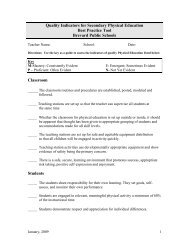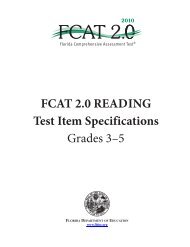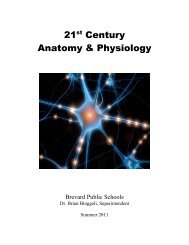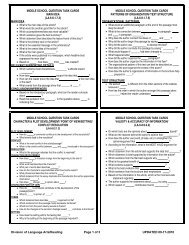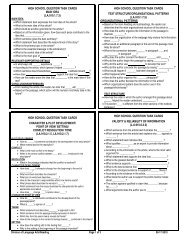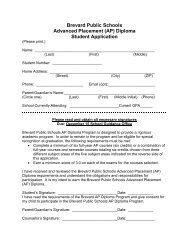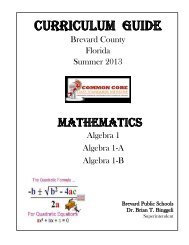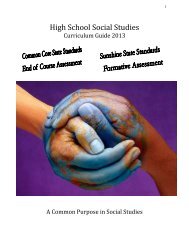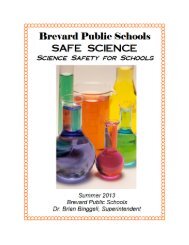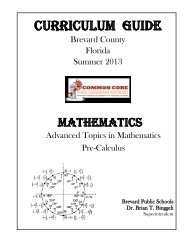Science Research Program Guide - Secondary Programs Home ...
Science Research Program Guide - Secondary Programs Home ...
Science Research Program Guide - Secondary Programs Home ...
You also want an ePaper? Increase the reach of your titles
YUMPU automatically turns print PDFs into web optimized ePapers that Google loves.
A. Additional Rules for Projects<br />
Conducted in a Non-regulated Site<br />
Vertebrate animal studies may be conducted at a non-regulated<br />
research site (home, school, farm, ranch, in the field, etc.). This<br />
includes:<br />
• Studies involving animals in their natural environment<br />
• Studies involving animals in zoological parks<br />
• Studies involving livestock that use standard agricultural<br />
practices.<br />
1) These projects must adhere to BOTH of the following<br />
guidelines:<br />
a. The research involves agricultural, behavioral,<br />
observational or supplemental nutritional studies on<br />
animals.<br />
AND<br />
b. The research involves only non-invasive and nonintrusive<br />
methods that do not negatively affect an<br />
animal’s health or well-being.<br />
(Note: All studies not meeting the above criteria must be<br />
conducted at a Regulated <strong>Research</strong> Institution. See<br />
Section B. below.)<br />
2) Animals must be treated kindly and cared for properly.<br />
Animals must be housed in a clean, ventilated, comfortable<br />
environment compatible with the standards and<br />
requirements appropriate for the species used. They must<br />
be given a continuous, clean (uncontaminated) water and<br />
food supply. Cages, pens and fish tanks must be cleaned<br />
frequently. Proper care must be provided at all times<br />
including weekends, holidays, and vacation periods.<br />
Animals must be observed daily to assess their health and<br />
well-being. A Designated Supervisor is required to oversee<br />
the daily husbandry of the animals. The following<br />
documents offer space requirements and additional<br />
husbandry information:<br />
• Federal Animal Welfare Regulation<br />
• <strong>Guide</strong> for the Care and Use of Laboratory Animals<br />
• <strong>Guide</strong> for the Care and Use of Agricultural Animals in<br />
Agricultural <strong>Research</strong> and Teaching (Ag-<strong>Guide</strong>)<br />
3) The Scientific Review Committee must determine when a<br />
veterinarian is required to certify that the research plan and<br />
animal husbandry are appropriate. This certification is<br />
required before experimentation and the prior SRC<br />
approval. It is highly recommended that a veterinarian be<br />
consulted in experiments that involve supplemental<br />
nutrition and/or activities that would not be ordinarily<br />
encountered in the animal’s daily life.<br />
4) If an unexpected illness or emergency occurs, the affected<br />
animals must have proper medical and nursing care that is<br />
directed by a veterinarian. A student researcher is expected<br />
to stop experimentation if there is significant weight loss or<br />
death in the experimental subjects. The experiment can<br />
only be resumed if the cause of illness or death is not<br />
related to the experimental procedures and if appropriate<br />
steps are taken to eliminate the causal factors.<br />
5) Animals may not be captured from or released into the<br />
wild without approval of authorized wildlife or other<br />
regulatory officials. Fish may be obtained from the wild<br />
only if the researcher releases the fish unharmed, has the<br />
proper license, and adheres to state and local fishing laws<br />
and regulations.<br />
6) The final disposition of the animals must be considered<br />
and explained on Vertebrate Animal Form (5A).<br />
Euthanasia for tissue removal and/or pathological analysis<br />
is not permitted for a project conducted in a non-regulated<br />
site.<br />
7) After initial SRC approval, a student with any proposed<br />
changes in the Student Checklist (1A) and <strong>Research</strong> Plan<br />
of the project must repeat the approval process before<br />
laboratory experimentation/data collection resumes.<br />
8) The following forms are required:<br />
a. Checklist for Adult Sponsor (1)<br />
b. Student Checklist (1A)<br />
c. <strong>Research</strong> Plan<br />
d. Approval Form (1B)<br />
e. Vertebrate Animal Form (5A)<br />
f. Qualified Scientist Form (2), if applicable<br />
B. Additional Rules for Projects<br />
Conducted in a Regulated <strong>Research</strong><br />
Institution<br />
All studies not meeting the criteria in Section A. must be<br />
conducted in a regulated research institution. A regulated<br />
research institution is defined as a professional research/<br />
teaching institution that is regularly inspected by the USDA<br />
and is licensed to use animals covered by the Animal Welfare<br />
Act. Also included are all federal laboratories such as National<br />
Institutes of Health, Veteran’s Affairs Medical Centers and the<br />
Centers For Disease Control. In addition, pharmaceutical and<br />
biotechnology companies that utilize research animals that are<br />
not covered by the Animal Welfare Act but have an operational<br />
Institutional Animal Care and Use Committee and program<br />
structured in compliance with U.S. federal laws are included in<br />
this definition.<br />
(NOTE: Some research that is permissible for professionals in<br />
research institutions is not appropriate for pre-college<br />
students.)<br />
1) The Institutional Animal Care and Use Committee (IACUC)<br />
must approve all student research projects before<br />
experimentation begins. Such research projects must be<br />
conducted under the responsibility of a principal<br />
investigator. The local SRC must also review the project to<br />
certify that the research project complies with ISEF Rules.<br />
This SRC review should occur before experimentation<br />
begins.<br />
Page 18 International Rules for Precollege <strong>Science</strong> <strong>Research</strong>: <strong>Guide</strong>lines for <strong>Science</strong> and Engineering Fairs / 2008-2009



